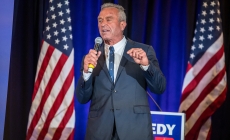-
RFK Jr. Could Swing 2024 Election—But Which Way? - May 15, 2024
-
A portion of Mulholland Drive, damaged by mudslides in winter storms, reopens - May 26, 2024
-
‘Maybe You Don’t Want to Win’ - May 26, 2024
-
Donald Trump Putting Law Enforcement in Danger: Attorney - May 26, 2024
-
Avoid the waters of these 5 L.A. County beaches this holiday weekend, public health officials say - May 26, 2024
-
Bawdy Comedy ‘Anora’ Wins Palme d’Or at Cannes Film Festival - May 26, 2024
-
Map Shows Heat Wave Zone Spread Into Five New States - May 26, 2024
-
Azusa police arrest suspected slingshot-wielding vandal - May 25, 2024
-
Donald Trump Hammers Judge Ahead of Jury Instructions - May 25, 2024
-
Sometimes U.S. and U.K. Politics Seem in Lock Step. Not This Year. - May 25, 2024
RFK Jr. Could Swing 2024 Election—But Which Way?
With six months to go until the 2204 election, questions remain about just how much of an impact independent candidate Robert F. Kennedy Jr. will have on the outcome.
Kennedy, who began his White House bid challenging President Joe Biden in the Democratic primary before changing to an independent, is considered a longshot presidential candidate at best. Polls frequently suggest he is hovering around 10 percent in support.
However, Kennedy is seen as the biggest threat because of who he might draw supporters from. Both Biden’s and Donald Trump’s teams seem concerned that he would siphon votes for them in the close November race.
There have also been suggestions that Kennedy may benefit from voters’ lack of enthusiasm for Biden’s and Trump’s latest White House campaigns and could potentially have an outsized influence in the results of key swing states where the margins of victory are so fine.
“Robert Kennedy, Jr. is going to impact the race, but how he will impact it is very difficult to predict,” David B. Cohen, a professor of political science at the University of Akron, told Newsweek.
“This is not to say that Kennedy has a chance of winning in November—he doesn’t. But he can—and just may—well be a spoiler. Kennedy will likely be on the ballot of most if not all, battleground states.”
Newsweek reached out to Kennedy’s office via email for comment.

SERGIO FLORES/AFP/Getty Images
Predicting Kennedy’s role in the 2024 election is also difficult when considering who will actually vote for him.
Kennedy has the family name of a Democratic dynasty, combined with a long history of environmental activism. However, he is also a known anti-vaccine conspiracy theorist and recently called Biden a “worse” threat to democracy than Trump.
In recent weeks, Trump has started increasing his attacks on Kennedy amid talk of his threat to the Republican’s campaign, including calling him a “Democrat plant” and a “radical left liberal who’s been put in place in order to help crooked Joe Biden” win November’s race.
“A lot of people think that Junior is a conservative. He’s not, he’s more liberal than anybody running on the Democrat side,” Trump said in a video posted onto Truth Social. “A vote for Junior would essentially be a wasted protest vote that could swing either way but would only swing against the Democrats if Republicans knew the true story about him.”
Polling is also split as to whether Kennedy’s White House run is more likely to damage Trump’s or Biden’s campaigns.
On May 12, a poll of 1,240 likely voters conducted by Zeteo and Data For Progress showed Biden narrowly ahead of Trump in a face-to-face 2024 race (47 percent to 46).
When Kennedy and other third-party candidates such as Cornel West and Jill Stein were added to the survey, Trump was the leader at 41 percent compared to Biden’s 40 percent and Kennedy at 12 percent.
An NBC News poll on April 21 revealed opposite findings. The survey found Trump leading Biden 46 percent to 44 percent in a head-to-head matchup. When the ballot is expanded to include the other candidates, Biden leads with 39 percent, followed by Trump with 37 percent and Kennedy with 13 percent.
Bernard Tamas, an associate professor of political science at Valdosta State University, suggested that polling six months before an election is a “very weak indicator” of how third-party and independent candidates will fare in a general election.
“Nonetheless, as voters become more familiar with RFK Jr.’s policy stances, the threat to Trump could increase,” Tamas told Newsweek. “While RFK Jr. has a privileged last name and comes from a family with a storied Democratic legacy, many of his policy positions are more likely to appeal to conservative voters, including the peddling of his anti-vaccine conspiracy theories and his pro-Israel position in the Gaza crisis.
“His argument that Biden is more of a threat to democracy than Trump is also more likely to resonate with conservative than progressive voters. RFK Jr.’s reluctance to address the issue of abortions and recent flip-flopping on reproductive rights also weakens his position with progressives.”
Tamas added that, given the likelihood of the 2024 election between Biden and Trump being a tight race, even losing “a small percent of votes” to candidates like Kennedy could easily cost them the election.
“Since 2000, the Democratic and Republican candidates have only been a few percentage points apart in terms of votes won, and so only a small percent shift in the 2024 vote—potentially by a third-party or independent candidate siphoning off even a low percent—could swing the election in either direction,” Tamas said.
There have been recent examples of third-party candidates having arguable outsized influence on the outcome of the overall election results, especially from left-leaning candidates.
In 2016, Democratic candidate Hillary Clinton lost three key states to Donald Trump by less than one percentage point: Michigan (47 to 47.2), Pennsylvania (47.4 to 48.1) and Wisconsin (46.4 to 47.2). In each case, Green Party candidate Jill Stein had received enough votes in the three states to have swung it for Clinton if her supporters backed the Democrat instead.
In the 2000 election, Green Party candidate Ralph Nader received more than 97,000 votes (1.64 percent) in Florida. The election between Republican George W. Bush and Democrat Al Gore was so close that it came to a controversial recount in the Sunshine State, with Bush eventually being declared the winner by a margin of just over 500 votes.
Cohen also believes that Kennedy may pose a risk to Trump and Biden’s White House bid should he make the presidential debate state, becoming the first third-party or independent candidate to do so since Ross Perot in 1992.
“If this were to happen it would be a huge boon to his campaign. Let’s not forget that Perot won 19 percent of the popular vote in 1992 and was a big reason Bill Clinton defeated the incumbent president, George H.W. Bush, that year,” Cohen told Newsweek.
“Biden and Trump agree on very little, but both are in firm agreement at this point that they would like to see Kennedy out of the race or at least his presence significantly diminished. It is unlikely that they will get their wish—Kennedy is in it until the end, and if he gets on the debate stage, his influence and impact will likely grow.”
Uncommon Knowledge
Newsweek is committed to challenging conventional wisdom and finding connections in the search for common ground.
Newsweek is committed to challenging conventional wisdom and finding connections in the search for common ground.
Source link
































